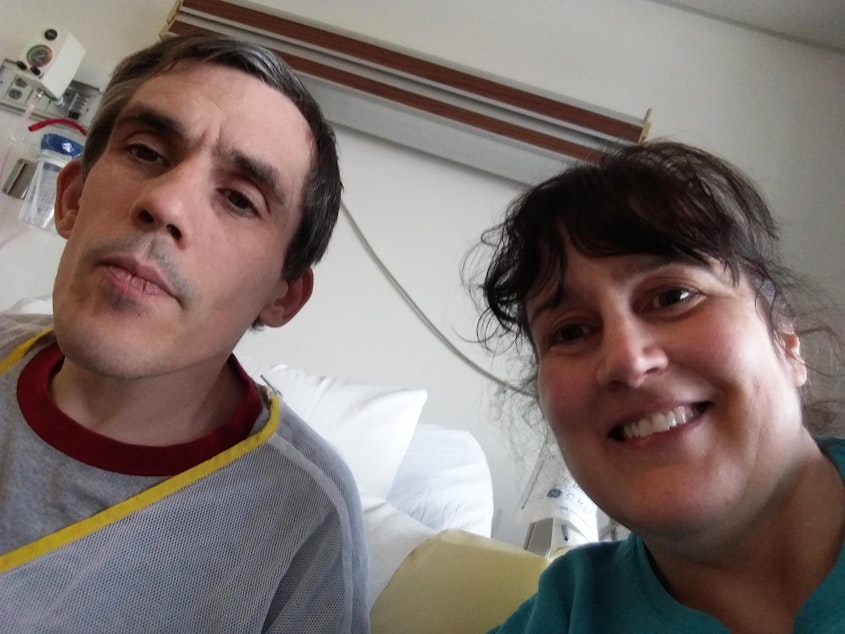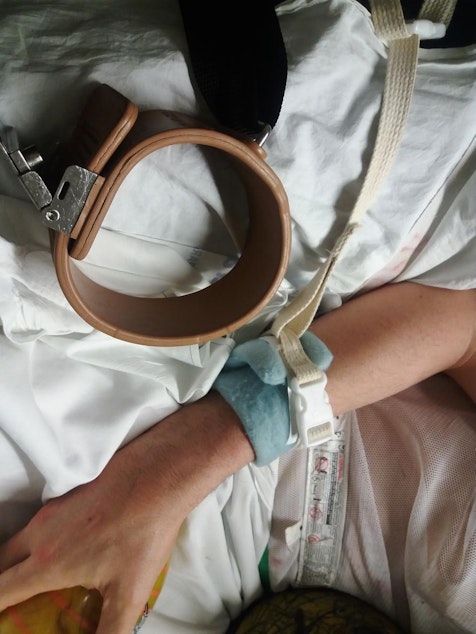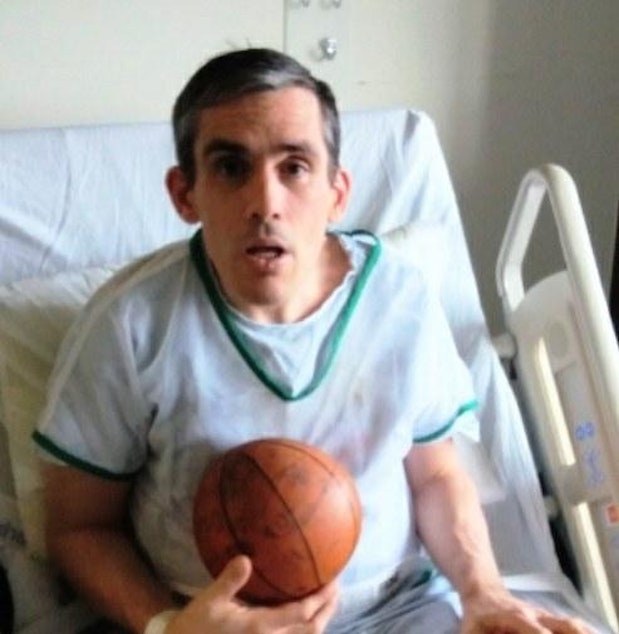Families, advocates sound alarm over patients stuck in the hospital without a medical need

Christopher Davis was lying on the floor watching cartoons one night last December while his mother, Beverly, decorated her Spokane home for Christmas.
From time to time, she showed him a decoration. But Christopher, a 46-year-old developmentally disabled man, just pushed them away.
“It’s going to be OK, Chris,” his mother recalled telling him that night. With that, she says, Christopher stood up, picked her up and tossed her across the living room.
Beverly, who is 74 and 5-foot-2, said she sustained a hairline fracture to her pelvis and a bruise down the length of her right leg.
Although Christopher -- who is autistic and nonverbal -- is often agitated, Beverly says the act of physical violence was surprising and unusual; she attributed it to a change in medication. The next day she called his doctor and then took Christopher to the emergency room.
More than eight months later, Christopher is still at Providence Sacred Heart Medical Center in Spokane.
He is one of hundreds of patients -- most on Medicaid, Medicare or both -- who are stuck in Washington hospitals because of a lack of community-based options. It's a growing problem that's drawn the attention of the Washington State Hospital Association, the state's developmental disabilities ombudsman, a handful of state lawmakers and even a rural emergency room physician.
Sponsored
In April, KING 5 television profiled Shawn Murinko, a disability rights expert and attorney at the Washington Department of Health, who was stuck in Harborview Medical Center in Seattle for more than six months following an accident.
The crisis prompted Murinko and Disability Rights Washington to file a lawsuit against the state alleging that developmentally disabled clients in Washington are “being stranded” in hospitals because community-based services are not available.
Christopher Davis was admitted to Sacred Heart not because he had a medical condition that required hospitalization. Rather, he was admitted because he was too unstable to be released back into the community, or what the hospital calls a “social admit.”
“It's just a mess,” said Beverly, who visits her son at the hospital most days.
She says Christopher is confined to his hospital room, outfitted with a special restraint vest designed to keep him in bed, and sometimes placed in wrist restraints. Recently, Beverly said, it took four security guards and four nurses to get her son back into bed. In this photo, Christopher Davis, who is autistic and nonverbal, is shown restrained to his hospital bed in Spokane. He has been hospitalized for more than eight months without a medical need to be there.
Sponsored
Sacred Heart hospital officials couldn't speak to specific cases, but said restraints are used as a last resort to keep patients safe.
While lawmakers have started responding to the crisis that leaves people like Christopher in this position, there are no immediate fixes and a long-term solution could be years off.

'A tipping point'
Besides the toll on individuals and their families, these patients are putting a strain on hospitals, which have a limited number of patient beds and are often not reimbursed for the cost of caring for people who don't have a medical need for hospital-level care.
“It kind of has hit a tipping point,” said Peg Currie, the chief executive of Sacred Heart Medical Center and Holy Family Hospital in Spokane.
On any given day, Currie said, as many as 110 of her hospitals' 700 patients are individuals who are medically stable, but can't be safely released from the hospital. These “long-length-of-stay” patients, as they're known, typically remain in the hospital for six to eight months until an appropriate long-term placement can be found. In one case, a patient stayed two years.
“It's the highest cost environment to get health care, and hospitals aren't really the place to be when you want to breathe fresh air and you want recreational therapy and to try to live a little bit more of a normal life,” Currie said.
In 2018, long-length-of-stay patients accounted for 11,000 patient days at Sacred Heart and Holy Family hospitals, Currie said, as well as roughly $12 million in uncompensated care.
Last summer, the Washington State Hospital Association surveyed 11 hospitals in the greater Puget Sound region and found that 1,441 patients stayed an average of 67 days beyond what was medically necessary.
Sponsored
In some cases, the patients arrive at the hospital with an acute care need and are admitted, but remain at the hospital after they are ready to be discharged. In other cases, like with Christopher Davis, there was never a medical need for hospitalization. In either scenario, the cycle begins when a caregiver brings the person to the emergency room -- for medical treatment or because their behaviors have become unmanageable -- and then can't or won't take the person back.
“And they can't be discharged to the streets, so it really presents a social conundrum to everyone involved,” Currie said.
Workforce crisis
The state of Washington, hospitals and advocates say the crisis of people stuck in the hospital has been building in recent years as the state's population swells, the needs of clients become more complex and as community-based providers struggle with a gaping workforce shortage, particularly among direct care staff.
“I hear every day from providers who say I would … be able to serve this client, but I don't have enough staff and I'm struggling to recruit and retain staff,” said Bea Rector, director of Home and Community Services, a division of Washington's Department of Social and Health Services.
Sponsored
As of Aug. 20, 356 Home and Community Services (HCS) clients were hospitalized, including one who had been waiting to leave the hospital for 289 days. A quarter of the clients had a diagnosis of dementia, making them particularly hard to place in the community, because the number of beds available for Medicaid-paid dementia care is limited.
Earlier this year, the hospital association asked state lawmakers for a $10 million increase in Medicaid long-term care payment rates for patients living with dementia, but that was not included in the 2019-21 state budget. Rector said her division is working to develop more specialty contracts with providers to care for the most difficult-to-place clients, such as those with dementia who exhibit assaultive behaviors. Currently, HCS has 74 contracts serving 855 clients with dementia.
“That's part of the solution,” Rector said, adding that her agency may also ask lawmakers for an increase in specialty provider rates next year.
Christopher Davis represents a second, smaller, but more vexing group of patients who are stuck in the hospital. They are clients of Washington's Developmental Disabilities Administration (DDA), which provides residential services to about 4,500 clients.
As of Aug. 27, 17 DDA clients, including three younger than 18, were waiting to transition from the hospital to a community-based setting. That was down from 24 clients in February. Of the 17, two clients had been offered placements, but either the client or their family declined, according to DDA.
“Our numbers are small, but I have to tell you even one individual that's in the hospital longer than they need to be is one too many,” said Evelyn Perez, the assistant secretary who oversees DDA.
The average length of stay in the hospital for DDA clients is 107 days, according to the agency; the longest stay to date is 255 days.
Perez said a growing demand for DDA services combined with a shortage of community providers has put a strain on the system in recent years. Providers of in-home care for DDA clients, known as supported living, report that front-line staff turnover is 50 percent, according to the state.
This year, Washington lawmakers funded a 13.5 percent increase in reimbursement rates for supported living providers. That one-time increase, which takes effect in January, falls short of the 20 percent increase that was requested. The budget also funds seven additional state-operated residential beds for DDA clients and a handful of crisis diversion beds beginning in 2021.
But Perez cautioned it's not enough to solve the problem.
“We are doing all the things we can within our resources,” Perez said. “[But] until the bigger systems are fixed … this is a challenge.”

'Very disappointed'
Last December, Betty Schwieterman, Washington's developmental disabilities ombudsman, released an eight page report titled “Stuck in the Hospital” that sounded the alarm about the issue.
“Hospital staff are not trained to provide support to people with developmental disabilities and hospitals are often stressful living environments,” the report states. “The situation is dangerous for the individuals and costly to the medical system.”
The report includes several examples of DDA clients who were hospitalized unncessarily, including:
- A man named Juan who spent six weeks in the hospital, often with his hands and feet restrained, until a crisis diversion bed opened up;
- A man named Tony who spent more than 100 days in the emergency room, restrained and with a security guard watching over him, after his provider dropped him off;
- An unnamed 21-year-old woman who spent nearly four months in the hospital after her caregiver took her to the hospital because of behavior issues;
- An unnamed teenager who spent six weeks in the hospital after being dropped off due to behavior challenges.
The report makes a number of recommendations for how the state and lawmakers could address the crisis, including requiring an incident report when a DDA client is hospitalized and boosting wages for care providers. The report also calls for more data collection to better understand the scope of the problem.
During the 2019 legislative session, Washington lawmakers passed a bill to require DSHS to track the number of people unnecessarily languishing in hospitals. However, Schwieterman says the data collection required under the new law is inadequate.
“I was very disappointed,” Schwieterman said. “We wanted to get a good picture of what was happening with this issue and we got very little.”
Schwieterman said the unnecessary hospitalizations are causing harm.
She's heard reports of people who've been physically restrained for the first time in their lives after being hospitalized. She's also heard of people who, while living in a hospital, decompensated mentally to the point that they qualified for involuntary treatment in a psychiatric hospital.
Schwieterman says about 40 percent of DDA clients have a mental health diagnosis, a figure the state was unable to confirm.
“We don't have a system that is serving them at this point in time,” Schwieterman said.
State Sen. John Braun, the ranking Republican on the Senate Ways and Means Committee, echoes Schwieterman's disappointment regarding the pace of action on this issue. In January, he introduced legislation to require better tracking of unnecessary hospitalizations, as well as state reimbursements to hospitals for the cost of care. His bill didn't pass, but elements were included in legislation that did.
“It's surprising that we let this type of thing happen in our state without taking more aggressive action to prevent it,” Braun said.
Democratic state Rep. Timm Ormbsy of Spokane, the chair of the House Appropriations Committee, said lawmakers got “anecdotal” information about the issue during the 2019 legislative session.
Recently, Ormbsy met with Providence officials in Spokane regarding patients who are stuck in the hospital. He said the problem is rooted in the rates the state is paying community-based providers.
“The providers are going to lean towards easier-to-care-for patients and the more complex patients are going to languish,” Ormbsy said.
But Ormsby said he's not yet willing to make promises about additional funding increases when lawmakers write a supplemental budget next year.
“It is so premature to start talking about what we can do in a supplemental budget,” Ormsby said.
'I give him his shower'
For Beverly Davis, a new routine has developed during the eight months her son Christopher has been at Sacred Heart hospital in Spokane. Christopher Davis has been unnecessarily hospitalized at Providence Sacred Heart Medical Center in Spokane for more than eight months. His 74-year-old mother visits him almost daily and helps with his care.
Most mornings she takes a Paratransit van to the hospital and spends the day helping the staff care for Christopher.
“I give him his shower in the morning, I shave him … and set up his tray for his meals and then before I leave at night, I brush his teeth,” Beverly said.
But it hasn’t been easy.
In May, the hospital went to court to try to get Beverly’s guardianship revoked on the grounds that she was refusing reasonable placements for Christopher.
Beverly had opposed a temporary move to a state-run facility for the developmentally disabled because Christopher had been there before and she wasn't happy with his treatment. She also refused a placement in the Tri-Cities for Christopher, which she says was too far from family.
The judge denied the hospital’s motion and dismissed the complaint, but ordered court monitoring of future placement decisions, said Genevieve Mann, Beverly's attorney.
Recently, Beverly thought the state had found a temporary diversion bed for Christopher, this time in Spokane, which she agreed to. But when the facility's staff came to evaluate Christopher, she said, they determined they would be unable to support his needs.
Beverly also feels unable to support Christopher in her home. The reason he was living with her last year is because, in April 2018, the state decertified his supported living provider. When subsequent placements didn't work out, she decided to try having him live with her. For now, Beverly says, she'd rather her son remain at Sacred Heart, even though it's far from ideal.
“At this point I'm petrified of even letting Chris out of the hospital,” Beverly said. “To go where? And be abused?”
In recent weeks, Beverly has met with an attorney from Disability Rights Washington to discuss Christopher’s situation.
“I just want him in a place where he will be respected and treated well, not have abuse, someone who can be kind and compassionate towards him, who would talk to him,” Beverly said.




